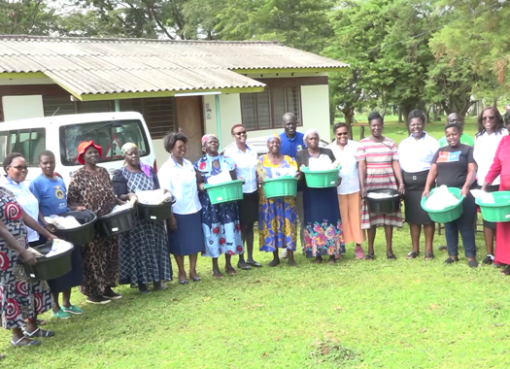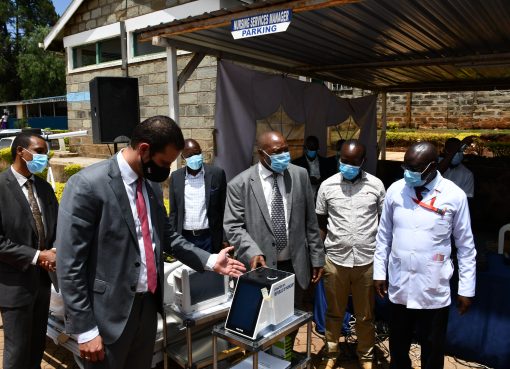The World Food Programme (WFP) has helped Marsabit county government to formulate four policies geared towards spurring sustainable development and job creation.
The organization is also actively engaged in an initiative to empower the youth through agribusiness in which 673 jobs were created last year.
Speaking at the county government headquarters during the launch of the strategies WFP Country Director Lauren Landis said that the efforts were centered on enabling local communities to become self-reliant.

Ms. Landis said that the policies that included early childhood development and education (ECDE) meals, ECDE meals policy implementation guidelines, trade and investment policy and food safety and quality strategy were expected to prepare the people of Marsabit to face the future with certainty.
She said that the organization was concerned with providing local communities with tools, knowledge and resources to enable them to adapt and thrive despite the challenges of climate change.
The Country Director noted that through a memorandum of understanding, WFP is able to initiate food systems that integrate resilient building in investments and other activities which connect the local communities to both the county and national government.
“These policies that we developed in collaboration with the county and national government are set to offer the local pastoralist communities with adaptive means to climate change,” she said.
The policy on food safety and quality strategy comes at a time when the devolved unit is concerned about smuggling of uncertified food stuff especially cereals into the county to bridge supply gaps occasioned by drought.
WFP has funded the establishment of seven food testing mini-labs across the county in a bid to help address the problem of contamination and aflatoxin.
On agri-business, Ms. Landis said that her organization in collaboration with the MasterCard Foundation was undertaking a programme to empower the youth through value chains in the crop, livestock and fish sub-sectors.
Through agribusiness under the Vijana na Kilimo programme, WFP assisted in the creating and strengthening 673 jobs last year and was targeting to create another 1,000 this year.

“This programme, vijana na kilimo base, is not only creating job opportunities for the youth but opening other related sources of livelihood to the local communities in a sustainable manner as well,” she observed.
The Country Director who later visited a 10-acre agri-business smart horticultural farm at Dirdima in Moyale sub-county underlined the need to technologically advance agriculture in order to create wealth and address the problem of frequent famine and high malnutrition rates in the county.
At Dirdima, 105 groups of youth at 75 per cent the Vijana na kilimo programme has put in place a progressive food system where innovative agricultural practices including drip irrigation are used by young farmers in the semi –arid region.
The technical farm which is well managed with the guidance from extension agricultural officers from the government is filled with vegetables such as kales, spinach and tomatoes, fruits like water melons as well as cereals that include beans and maize.
According to Ms. Landis, WFP has donated farming related tools which include soil testing machines, solar power systems, water tanks and computers to the youth engaged in agri-business at a cost of Sh2.7 million.
These items provided under the WFP’s hunger wing efforts were meant to address capacity gaps through mechanization, production efficiency, reduced post-harvest loss, and promote gender equality which in turn create income generating opportunities for the youth.
“I am now convinced that food security can be achieved if at all plans and policy is done correctly,” she observed and advised on drought resistant crops as well as use of less expensive farm inputs like manual instead of artificial fertilizers.

KNA found a happy lot of female and male young farmers tending to their crops, harvesting and selling the produce which is largely consumed in the border sub-county of Moyale and the neighboring Wajir County.
Halima Hassan, who farms onions and tomatoes at the horticultural farm, says training offered by WFP has enabled her to diversify from over relying on livestock rearing which could not withstand the vagaries of weather.
She says that farming has many benefits including availability of enough quality food and income from sales of surplus production.
Halima, who came from a family that previously depended on relief food from the government and other agencies, was all smiles during the interview as her dignity had been restored.
“We are now self-reliant in food and we can, besides paying school fees for my siblings, also afford to go for quality medical treatment whenever any one of the family members falls sick,” she said amid a satisfying smile.
The initiatives by the World Food Programme were lauded by Marsabit Deputy Governor Solomon Gubo who said the county was faced with many environmental challenges which were compounded by recurrent drought patterns which undermines the livelihoods of the local pastoralist communities.
Gubo said the devolved unit was enhancing its agricultural extension services while farmers were being provided with certified seed in order to boost food production.
The Deputy Governor also termed the food safety and quality strategies as timely as the about 600 km porous border with neighbouring Ethiopia compromises food quality standards especially during drought periods as unscrupulous traders smuggled in food stuffs like maize and rice.
He said that the new policy would enable Marsabit county administration to overcome moral hazards by ensuring that food procured for relief aid as well as for commercial purposes are safe and of good quality.
“Ensuring that there is safe and quality food makes our people resilient,” he said.
By Sebastian Miriti





